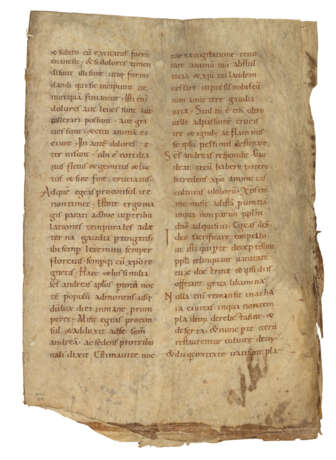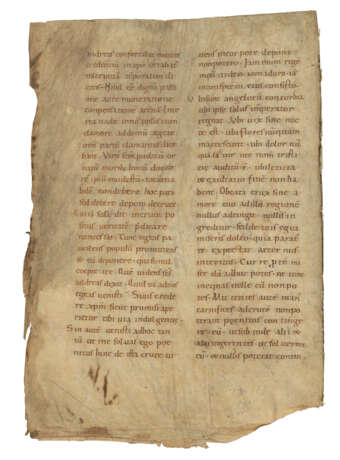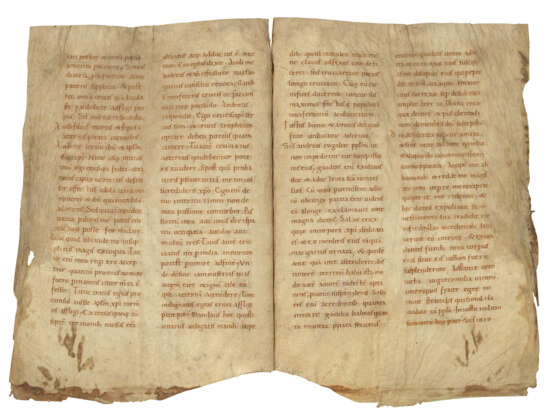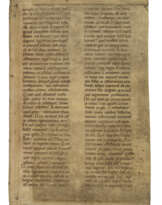ID 869409
Lot 16 | Attributed to Bede (673-735)
Estimate value
£ 2 500 – 3 500
A bifolium from the Passio Sancti Andreae Apostoli, in Latin, manuscript on vellum [Italy, 11th century].
A sister to the opening leaf of the text now at Occidental College in Los Angeles, of an apocryphal ‘Act of the Apostles’ composed in the 6th century and sometimes attributed to Bede.
c.346 × 240mm. The central bifolium of a gathering, each page with 2 columns of 27 lines, in a fine Caroline minuscule with letterforms featuring somewhat flattened bowls, and the base of minims occasionally extended to create the effect of a continuous baseline, the continuous text comprises part of Chapters 7–14 of the Passio Sancti Andreae Apostoli, (‘et subito cum excitatus […] et nullus poterat contin[gere?]’; cf. BHL 428, printed in M. Bonnet, ed., Acta Apostolorum Apocrypha, 2 vols (1898), I, pp. 1–37 at 17–32), which recounts a dialogue between St Andrew and Aegeas of Patros, and the apostle's subsequent martyrdom (somewhat cockled and stained, the edges irregular).
Provenance:
(1) Frederick North (1766–1827), 5th Earl of Guilford, colonial governor, philhellene, and book collector, many of whose manuscripts are now in the British Library; later descriptions state that the incomplete parent volume had Guilford’s bookplate; sold by R.H. Evans, Valuable and extensive library of the late Earl of Guilford, Part the Third, 28 February, 1829, lot 410; bought by Thorpe for :
(2) Payne & Foss, Catalogue of Manuscripts, Books Printed on Vellum [...], February 1830, item 1053; acquired from them by:
(3) Sir Thomas Phillipps: his nos. 4605 and 10614 (under the heading ‘Payne’: ‘Beda in Actus Apostolorum. l[arge] f[olio] V[ellum] s[aec.] x (Guilford)’; offered in the Phillipps sale at Sotheby’s, 27 April, 1903, lot 858, but presumably unsold, and re-offered in the Phillipps sale at Sotheby’s, 24 April, 1911, lot 71, and bought by Jacques Rosenthal for £4 5s.
(4) Colker MS 411; acquired in 1989 from Quaritch.
There are a number of 11th- or 12th-century interlinear corrections that provide insights into the text and script of the exemplar. For example, in the phrase ‘Ubi uix sine nocte est’, the word ‘dies’ has been written above ‘uix’: the scribe’s (or exemplar’s) ‘uix’ was a misreading of ‘lux’, and a later reader tried to make more sense of it. This and other mistakes suggest that the exemplar may have been extremely ancient – or at least that the scribe was unfamiliar with the script.
The first leaf of the manuscript is now at Occidental College, Los Angeles, on which see the blogposts for 19 January 2013 and 1 October 2013 at https://mssprovenance.blogspot.com/
| Genre: | Religious genre |
|---|---|
| Place of origin: | Italy |
| Auction house category: | Medieval & renaissance manuscripts |
| Genre: | Religious genre |
|---|---|
| Place of origin: | Italy |
| Auction house category: | Medieval & renaissance manuscripts |
| Address of auction |
CHRISTIE'S 8 King Street, St. James's SW1Y 6QT London United Kingdom | |
|---|---|---|
| Preview |
| |
| Phone | +44 (0)20 7839 9060 | |
| Buyer Premium | see on Website | |
| Conditions of purchase | Conditions of purchase |






